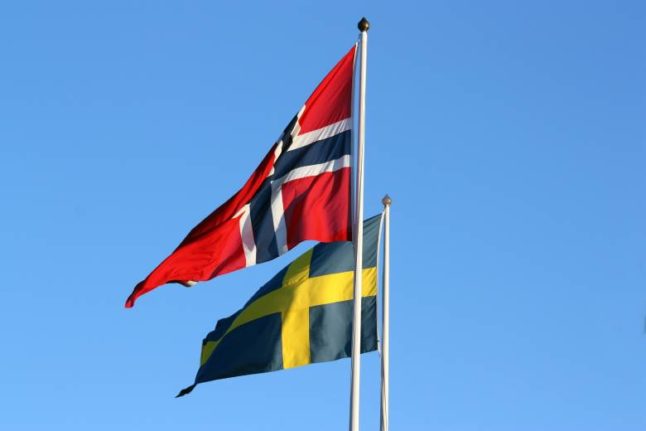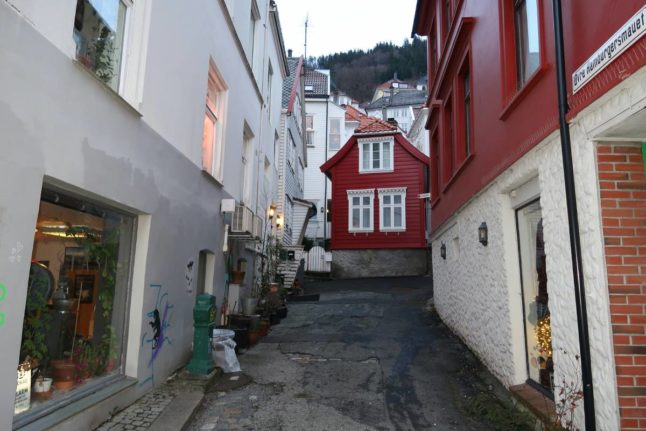Leave trash behind on hikes
Cleaning up after oneself – regardless of whether it’s after a barbeque at a city park or after a break during a hike – falls under the label of “basic decency” in Norway.
Norwegians are very proud of the fantastic nature that surrounds them, and most feel a deep connection with the vast northern outdoors.
The proper way of showing respect for the country’s ancient forests, pristine fjords, and numerous valleys is to keep them clean.
As Norway’s “Mountain Code,” a set of rules that help hikers stay safe and have an enjoyable experience, states: Respect the natural environment. Plan ahead and don’t leave any litter.
Bring up high prices on every possible occasion
Yes, Norway is expensive, and yes, even Norwegians are well aware of the fact. Don’t be surprised if your Norwegian friends or acquaintances get annoyed by your constant lamentations about the costs of living in the country (especially during the current financial crisis).
Enter someone’s house with your shoes on
Visiting a Norwegian friend for a housewarming party or social event? Take off your shoes.
It’s considered rude to stay in your shoes when entering a private residence. The weather in Norway tends to be quite volatile, and you wouldn’t want to bring snow, water, dirt, and small rocks into someone’s living room, would you?
Also, remember to wear clean socks on such occasions.

Drink publicly on a weekday
Generally speaking, you’ll rarely find Norwegians drinking on weekdays. There’s also a pretty strong stigma associated with weekday drinking – which draws its roots to more traditional and frugal times.
Don’t be surprised if your work colleagues give you the stink eye for suggesting a glass of wine or champagne on a Wednesday.
The weekends, on the other hand, are a completely different story.
Skip out on communal volunteer work (dugnad)
Ah, dugnad. That special occasion during which Norwegians show off-the-chart levels of openness and chattiness.
This old Norwegian cultural practice usually entails a group of people, such as neighbours or team members, gathering to do volunteer work for the benefit of their surroundings and community.
While the occasion has numerous upsides – it is often lauded as an opportunity to meet your neighbours and make friends in a relaxed “we can do it” environment, if you skip dugnad, you’ll raise more than a few eyebrows.
Not showing up might even be seen as a deliberate act of hostility and can also affect how your neighbours treat you moving forward.
Be critical of the frozen pizza cult
Norway is a nation of frozen pizza lovers, and Pizza Grandiosa is a household name throughout the country – so much so that around 600 million Grandiosa frozen pizzas have been sold since the product launched in 1980.
While foreigners tend to be confused as to why anyone would consider frozen pizza a beloved staple, you’ll be better off keeping such thoughts to yourself.
Decades of aggressive marketing have planted the idea of frozen pizzas as something delicious into the Norwegian collective consciousness – risk offending the frozen pizza gods at your own peril.
Don’t put butter on the table for virtually any meal
If it were up to Norwegians, butter would be proclaimed a national dish in itself!
We’re joking (sort of), but according to widespread belief, breakfast, lunch, dinner, and snack time can – and should be – upgraded by serving butter on the table.
If there’s bread involved, expect Norwegians to reach for the (preferably salted) butter.
If you fail to provide butter at a meal that you prepared (let’s say, Bergen fish soup with a side of toasted bread), be ready to meet the confused stares of your Norwegian friends, as well as disappointed sighs.
Sit close to a Norwegian on public transport
In Norway, people tend to be protective of their personal space. Therefore, if you choose to sit close to someone on public transport despite having other available options (crowded situations don’t count), you’ll raise an eyebrow.
This falls under the broader Norwegian social norm of not inconveniencing others – Norwegians try not to put others in weird situations and expect others to act in kind.
Doubt whether the national obsession with eating tacos on Fridays makes sense
Most people who move to Norway from another country are surprised by the fact that – similarly to the frozen pizza craze – there is also an obsession with tacos. There’s even a day in the week dedicated to eating tacos with friends and family, tacofredag (English: Taco Friday).
A decade after frozen pizzas became a thing, in the 1990s, tacos were introduced as another exotic food. As Norway did have much to show in terms of dishes that are shared at the table, tacos were considered a refreshing new option for dinner parties and family gatherings.
Talk smack about the tax levels
Norway is well known for its high tax levels. However, most Norwegians – at least if we are to trust polls – appreciate what the state does with their money and believe that the country’s welfare framework is a notion worthwhile supporting with their hard-earned kroner.
Therefore, don’t be surprised if Norwegians brag about paying taxes – they’re actually proud of the distribution of common benefits through the system.
Try to suppress any non-Norwegian cynicism (or real-life experience of how politicians in your country of origin used taxpayer funds), and avoid talking down about taxes in Norway.

Make negative remarks about Norwegian food
Most Norwegians know that their country’s dishes have a reputation for being bland. As a number of surveys show – including the recent Taste Atlas one, which ranked Norwegian food as the worst in the world – international visitors are clearly not impressed.
However, food remains a sensitive topic, and Norwegians quickly get annoyed if you bring up the fact that some of their traditional dishes seem a bit dull.
Strike up conversations with strangers
This one falls under the umbrella of “not inconveniencing others”, which we have already addressed in the article.
Generally speaking, Norwegians are protective of their personal space and don’t like to be disturbed – and if you respect these tendencies, chances are that they’ll return the favour.
No need to make things uncomfortable for both yourself and a stranger at a bus stop – save the small talk for a social occasion with friends.
Turn up to their home uninvited
There is a custom in some parts of Europe (especially in the southeast) for neighbours or good friends to pop up at each other’s door unannounced.
Do not engage in such social acrobatics in Norway – unless there is an emergency.
Norwegians tend to value their privacy and free time quite highly. Showing up at their place could also interfere with the plans they already made, so you’re almost certain to inconvenience them, which is a big no-no.
Make misinformed or generalised comments on Norway’s history
Though you might not notice it if you miss out on Norway’s national day celebration on May 17th, Norwegians are quite the patriotic bunch.
As such, they don’t take kindly to generalisations about their country’s history. Here’s an example. I was part of a group history tour in Bergen, and while the group mainly consisted of foreigners, there was also a Norwegian among us.
At one point, the tour guide started making broad and vastly generalised remarks about Norway’s role in the Second World War. This prompted our Norwegian group member to speak out:
“I’m sorry, I don’t usually do this, and I know that I might be making the others uncomfortable by speaking out, but this needs to be said. What you just said is historically incorrect.”
He then proceeded to provide the group with a more detailed and informed version of events.
Imagine the inner strength the Norwegian had to gather to speak out like that… It seems that even the “don’t inconvenience others” maxim has a limit. The limit? Love of country.

Criticise cross-country skiing – or skiing in general
Norwegians are among the biggest skiing aficionados in the world, and cross-country skiing, in particular, has a special place in their hearts.
Skiing has been around in Norway for centuries, and there is a number of saying that codify the strong bond between the nation and its skis, with the most famous being that Norwegians are born with skis on their feet.
Indeed, Norway’s love affair with skiing is so ingrained in the culture that it shapes the national identity, and if you truly want to annoy a Norwegian, feel free to criticise skiing as pointless, expensive, or not worth it.
The frustration in the surrounding air will become so thick that you’ll be able to cut it with a (butter) knife.
Make any comparisons with Sweden
Norway and Sweden have what would be best described as a type of rivalry among siblings (or neighbours).
Historically, Norway was the little brother (being smaller and having a smaller economy). However, things have started to change since Norway discovered oil.
The rivalry boils down to Norwegians and Swedes making jokes about each other and teasing the neighbour at any chance they get.
Therefore, if you want to annoy a Norwegian (or just rile them up a bit), say that Sweden has a better (insert virtually anything) and watch them unravel. Fun times.
| Banner ad |
Mow your lawn on a Sunday
In Norway, mowing your lawn on Sunday is illegal, as the associated noise disturbs the peace.
So, technically speaking, an attempt at keeping your garden in check with a lawnmower would not as much annoy a Norwegian as it would be a breach of the country’s laws.
This is also something that surprises a lot of international citizens who move to Norway. Usually, it goes like this: You move to Norway. You find a job, time passes, and you get a place with a lawn. As you have a busy workweek, you decide you’ll tend to your lawn on the weekend. You start your lawnmower on a Sunday, proud of the fact that your neighbours will be able to see the fruits of your diligence after you’re done.
Then, an annoyed Norwegian neighbour shows up in front of you and explains that what you’re doing is… illegal. And that the right thing to do is to mow the lawn on Friday afternoon or Saturday.
If you’ve made this mistake, you’re not alone: The police are often contacted during the summer months by people irritated over neighbours disturbing the peace on Sunday.
| Banner ad |
Ask whether they think the patriotism or May 17th celebrations are weird
We’ve saved the most delicate issue for last.
May 17th, Norway’s national day, commemorates the signing of the country’s constitution in 1814, which declared the country independent.
It is a day like no other all across Norway; cannons are fired at dawn, children’s parades and marching bands fill most cities’ streets, and special programs are in place nationwide.
Many Norwegians use the opportunity to dress in traditional costumes or elegant suits and dresses. The Norwegian flag is a big part of the celebrations, and you’ll see flags everywhere on the said day – on windows, on poles, painted on people’s faces…
Now, if you’re experiencing the May 17th delirium as a foreigner for the first time, it all may seem to be a bit… much.
Any such thought is best kept to yourself, as the pride in country and overall patriotism Norwegians feel on their Constitution Day is one of the core tenets of what it means to be Norwegian for a lot of people.
So, tread carefully, and if you decide to stir the proverbial hornet’s – red, blue, and white – nest, do so with caution and respectfully.



 Please whitelist us to continue reading.
Please whitelist us to continue reading.
Member comments